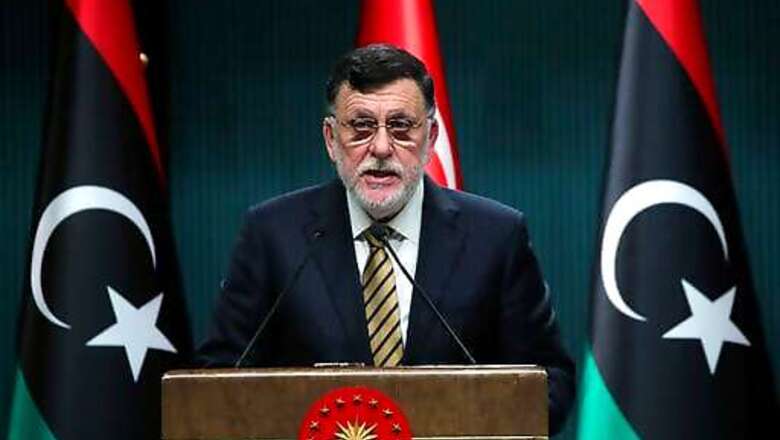
views
Libyan officials said Saturday that the leader of the U.N.-supported government would not support a deal with his primary rival in the country’s civil war to lift a months-long blockade on its vital oil trade.
According to an official at his office, Prime Minister Fayez Sarraj opposed the final deal struck with commander Khalifa Hifter, whose east-based forces led a failed year-long siege to take the capital, Tripoli, from the U.N.-backed government.
The prime minister did not give his approval to the final version of the deal, the official told The Associated Press, speaking on condition of anonymity.
Hifter said in a televised address Friday that his forces would allow the Libyan oil facilities to start operating again for the first time since January with conditions that ensure a fair distribution of revenue.
The deal to start pumping Libyan oil again appeared to have been spearheaded by the deputy prime minister, Ahmed Matiq, and emerged days after Sarraj said he planned to hand over power by the end of October to a new administration in Tripoli.
Matiq struck an agreement to distribute the countrys petrodollars more equitably between its warring sides, according to Ahmed al-Mosmari, the spokesman of Hifters self-styled Libyan Arab Armed Forces.
The deal between Matiq and Hifter’s representatives did not address the scores of Russian mercenaries from Wagner, a Kremlin-linked private security company, stationed across oil fields that the National Oil Corporation says remain a barrier to the resumption of exports.
Matiq surrendered very loose, very generous concessions to the LAAF, especially in the realm of banking and finance, said Jalel Harchaoui, a Libya expert at The Netherlands Institute of International Relations.
Harchaoui said the oil deal was already helping to revitalize” Hifter after months of military setbacks that followed Turkey’s military intervention supporting forces loyal to the Tripoli government.
Matiq largely negotiated the deal behind closed doors with Hifters son, Khalid, and its final shape took many Libyan leaders by surprise. Matiq and Hifters son met earlier this month in Russia, a key supporter of Hifter.
Osama al-Juwaili, a military leader with Tripoli-allied forces, called the agreement a farce” in televised comments. He urged Sarraj to announce his total position to the deal.
Gomaa al-Gamaty, Sarrajs envoy to the Maghreb countries, tweeted that the deal is likely to fail since the prime minister, national oil company and the Central Bank in Tripoli were not part of it.
Mustafa Sanallah, the NOCs chairman, rejected what he called secret and disorganized negotiations aiming to undercut an internationally-brokered political process to reopen the oil fields.
He said the corporation would not lift force majeure, a legal maneuver that lets a company get out of its contracts because of extraordinary circumstances, until Russian mercenaries, fighting alongside Hifter, leave the oil fields and export terminals.
Libyas highly prized, light crude has long been a factor in its civil war, as rival militias and foreign powers jostle for control of Africas largest oil reserves.
Powerful eastern tribes loyal to Hifter first seized control of the oil fields in January, cutting Libyas 1.2 million barrels a day to a trickle and starving the country of badly needed cash, to protest what they said were the inequitable distribution of revenues.
Libya was plunged into chaos when a NATO-backed uprising in 2011 toppled and killed longtime ruler Moammar Gadhafi. The country has since split between rival east- and west-based administrations, each backed by armed groups and foreign governments.
The blockade has deprived the Tripoli-based National Oil Corporation of nearly $10 billion in revenue and led to nationwide fuel shortages.
Disclaimer: This post has been auto-published from an agency feed without any modifications to the text and has not been reviewed by an editor




















Comments
0 comment